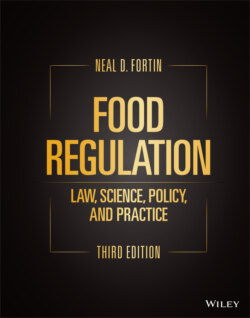Читать книгу Food Regulation - Neal D. Fortin - Страница 35
Free Speech
ОглавлениеLaws may be invalidated because they conflict with the part of the First Amendment that protects the free communication of ideas: “Congress shall make no law … abridging the freedom of speech or of the press … .” As with all the Bill of Rights, the First Amendment rights are not absolute and may be abridged under certain circumstances. Justice Holmes famously noted that the First Amendment does not afford a right to cry “fire” in a crowded theater.
In Cox v. New Hampshire, 312 U.S. 569 (1941), the U.S. Supreme Court upheld an ordinance that required parade permits, although a group who challenged the law argued that it abridged their First Amendment rights of assembly and communication. The Court concluded:
The authority of a municipality to impose regulations in order to assure the safety and convenience of the people in the use of public highways has never been regarded as inconsistent with civil liberties, but rather as one of the means of safe‐guarding the good order upon which they ultimately depend … . The question in a particular case is whether that control is exerted so as not to deny or unwarrantedly abridge the right of assembly and the opportunities for the communication of thought and the discussion of public questions immemorially associated with resort to public places.
Source: Cox v. New Hampshire, 312 U.S. 569 (1941), U.S. Supreme Court. Public domain.
First Amendment issues will be discussed in later chapters regarding the right of free expression of commercial speech in conjunction with food advertising and claims.
